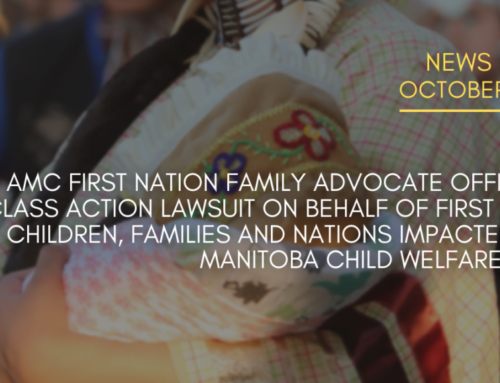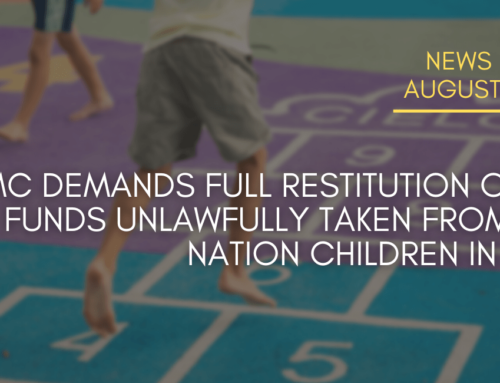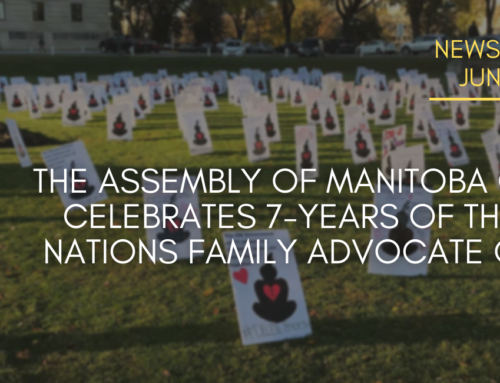 Treaty One Territory, Manitoba – The Assembly of Manitoba Chiefs (AMC) is expressing concern over the protocol agreement between the Assembly of First Nations (AFN) and Indigenous Service Canada (ISC) intended to facilitate implementation of Bill C-92, and the coercive pressure it creates for First Nations to opt into Bill C-92, An Act Respecting First Nations, Inuit, and Metis Children, Youth and Families.
Treaty One Territory, Manitoba – The Assembly of Manitoba Chiefs (AMC) is expressing concern over the protocol agreement between the Assembly of First Nations (AFN) and Indigenous Service Canada (ISC) intended to facilitate implementation of Bill C-92, and the coercive pressure it creates for First Nations to opt into Bill C-92, An Act Respecting First Nations, Inuit, and Metis Children, Youth and Families.
Grand Chief Arlen Dumas stated, “This protocol agreement in support of a pan-Indigenous piece of legislation has the potential to do further damage to First Nations inherent and constitutional rights across this country; moreover, it has the potential to further undermine the special relationship established through Treaty between sovereigns, pre and post confederation.”
“The AMC was not notified or given any warning that a possible threat to our rights was imminent by the signing of this agreement. This is more than concerning, given the unique needs of First Nations in Manitoba and the region as a whole for ground zero for First Nations child welfare apprehensions. The oppressive provincial child welfare policies have made Manitoba the world leader for Indigenous child welfare apprehension; and it’s unacceptable and disrespectable that we only heard about this signing through the media. We stand with the AFN Executive members who abstained or voted against the signing of this agreement,” continued Grand Chief Arlen Dumas.
“The AMC also signed an MOU in 2017 with the federal government in relation to a Manitoba specific process and to enable the Bringing our Children Home Act (BOCHA), an agreement that was not honoured by our federal partners as evidenced by the passing of C-92 in its current form. The BOCHA was, and is, an expression of Manitoba First Nation’s sovereignty, self-determination and an attempt to occupy the legal field with regard to Child Welfare. This principled Manitoba First Nations stance as outlined in the 2017 MOU was ultimately rejected by the federal government with no real justification or dialogue with the rights holders and their political representatives in this region.”
“The AMC and the First Nations Women’s Council will continue to pursue the Bringing Our Children Home Act for First Nations in Manitoba. We will exhaust all options and consider all legal avenues until Manitoba First Nations child welfare laws are respected in a meaningful way and as envisioned by First Nations citizens, youth, leadership, Elders and Knowledge Keepers. Many years of hard work have gone into a Manitoba First Nations child welfare law framework based on our languages, and we will not accept any process that undermines or supersedes our rights and processes.”
The AMC will continue to highlight the discussion from the Bringing Our Children Home National Conference, where the principled Manitoba First Nations positions on governance models and frameworks free from provincial interference were clearly stated; our positions on policy and funding, including critically needed prevention funding, were clear articulated to government and for a national audience.
Grand Chief Arlen Dumas further states, “Prescriptive legislative approaches often perpetuate institutional and systemic racism, which we have seen and experienced first-hand for many years in Manitoba child welfare systems. The current C-92 legislation provides an illusion that it is enabling First Nations to practice their inherent right to care for their children. But nothing could be further from the truth. This illusion depends on current provincial laws and colonial frameworks that First Nations are forced to work within. For First Nations to develop their laws under this prescriptive process, they need to enter into coordination agreements with the province. The reason why our First Nations are in this crisis is because of the province and its decisions to remove children from their families and communities. But at the same time, the federal government is asking us to work with them so that we can develop our laws. It’s contradicting. The whole provincial child welfare system in Manitoba must be dismantled for First Nations to meaningfully take control of Child Welfare.”
Grand Chief Arlen Dumas concluded, “If we are going to start new, we need to focus on addressing the harm through a culturally appropriate lens as well as the systemic racism at the root of the immoral and unjust apprehension of our children. Right now, all funding for prevention goes to the provincial Child and Family Services agencies. It’s always been AMC’s stance that all funding, particularly the critically needed prevention funding to ensure kids are not taken from their families because of poverty, should go directly to First Nations. We need to invest in our children and families in a real way to give the current generation a chance and for the benefit of our future generations.”






